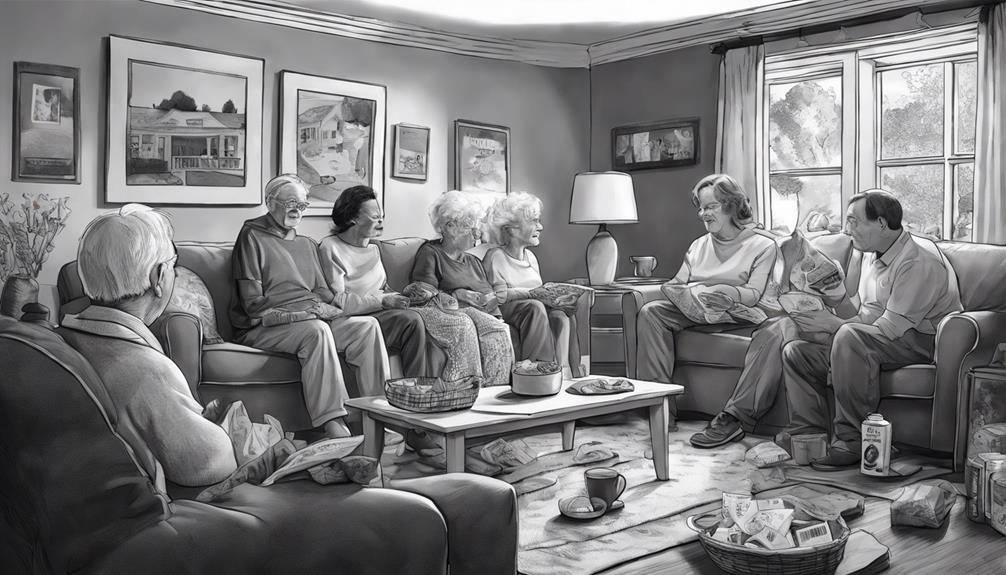Not many people realize this, but the movie industry has created a variety of films that skillfully delve into the complex realities of dementia and Alzheimer’s disease. These movies effectively depict the challenges of memory loss and the impact it has on individuals and their families.
As we delve into this cinematic realm, we will uncover how these stories not only capture the challenges but also celebrate the resilience and humanity that shines through in the face of such hardships.
Key Takeaways
- Dementia movies explore love, family, and memory loss themes.
- Emotional journey of those affected by Alzheimer's depicted in films.
- Caregiving responsibilities and family dynamics central in dementia films.
- Insights into navigating Alzheimer's complexities within family dynamics offered.
Top Dementia Movies to Watch
When considering the top dementia movies to watch, it's essential to explore compelling narratives that authentically depict the complex realities of individuals living with cognitive decline. One poignant portrayal is seen in 'Still Alice' (2014), where Julianne Moore delivers a powerful performance as a linguistics professor facing early-onset Alzheimer's. Through her character, the audience witnesses the profound impact of the disease on not just the individual but also on their loved ones.
In 'The Notebook' (2004), based on Nicholas Sparks' novel, the theme of enduring love is tested by Alzheimer's, showcasing the unwavering dedication of a husband to his wife as she battles the condition. Julie Christie's Oscar-nominated role in 'Away From Her' (2007) offers a heart-wrenching depiction of a woman voluntarily entering a care home due to Alzheimer's, highlighting the complexities of relationships in the face of this disease.
These films authentically capture the essence of dementia, exploring themes of love, friendship, and family dynamics in the context of cognitive decline, making them essential viewing for anyone seeking a deeper understanding of this challenging condition.
Must-See Films on Dementia

Exploring the emotional impact of dementia through cinema reveals the intricate layers of human experience intertwined with cognitive decline. When it comes to understanding the complexities of Alzheimer's and dementia, certain films stand out as must-sees for their poignant portrayal of the challenges faced by individuals and their loved ones. Below is a curated list of movies that expertly capture the essence of dementia:
| Movie Title | Key Highlights |
|---|---|
| Still Alice (2014) | Julianne Moore's Oscar-winning performance as a linguistics professor facing early-onset Alzheimer's. |
| Away From Her (2007) | Julie Christie's Oscar-nominated role as a woman who chooses to enter a care home due to Alzheimer's. |
| The Savages (2007) | Siblings played by Laura Linney and Philip Seymour Hoffman navigating their father's dementia. |
These films delve into themes of memory loss, love, friendship, and the impact of dementia on individuals and their relationships. By watching these movies, viewers can gain a deeper understanding of the emotional journey experienced by those affected by Alzheimer's and dementia.
Powerful Dementia Movie Recommendations
To further enhance our understanding of dementia's emotional impact, let's highlight some powerful movie recommendations that intricately portray the complexities of Alzheimer's and cognitive decline.
- 'Still Alice' (2014) – This film delves into the life of a linguistics professor, Alice, who grapples with early-onset Alzheimer's, showcasing the profound challenges of memory loss and its impact on family dynamics and relationships.
- 'The Notebook' (2004) – Through the heartfelt story of Noah and Allie, this movie poignantly illustrates the unwavering love and dedication of a partner caring for someone with Alzheimer's, emphasizing the importance of unconditional love and caregiver support.
- 'Iris: A Memoir of Iris Murdoch' (2001) – By portraying Iris Murdoch's Alzheimer's journey, this film beautifully captures the essence of unconditional love amidst the struggles of cognitive decline. It sheds light on the caregiver's role, the complexities of memory loss, and the profound impact on relationships, making it a compelling watch for those seeking insight into the challenges and nuances of dementia caregiving.
Emotional Dementia Films List

In emotional dementia films, the portrayal of love, loss, and resilience amidst Alzheimer's and cognitive decline resonates deeply with viewers, offering poignant insights into the complexities of relationships affected by the disease. These films delve into the emotional journey of individuals grappling with Alzheimer's, capturing the challenges faced by both patients and their caregivers.
Family dynamics play a central role in these narratives, showcasing the intricate web of emotions and responsibilities that come with caring for a loved one with dementia. Through poignant storytelling, emotional dementia films shed light on the sacrifices, struggles, and moments of connection that define the caregiving experience.
Themes of resilience and enduring love permeate these movies, illustrating the profound impact of Alzheimer's on relationships and underscoring the strength and vulnerability inherent in such situations. By exploring the emotional landscape of Alzheimer's, these films offer valuable insights into the human experience of navigating the complexities of the disease within the context of love and family dynamics.
Impactful Alzheimer's Movies
Numerous impactful Alzheimer's movies have left a lasting impression on audiences, shedding light on the complexities of the disease and its profound effects on individuals and their relationships. These films provide a glimpse into the challenges faced by those living with Alzheimer's and their loved ones, showcasing the emotional rollercoaster that often accompanies the progression of the disease.
Some notable examples include:
- *'Still Alice' (2014)* – This film follows the journey of Alice Howland, a linguistics professor grappling with early-onset Alzheimer's, highlighting the devastating impact of the disease on her career and relationships.
- *'Away From Her' (2007)* – Featuring Julie Christie's Oscar-nominated performance as Fiona, who makes the difficult decision to move into a care home as her Alzheimer's progresses, showcasing the heart-wrenching realities of memory loss and identity.
- *'The Savages' (2007)* – Through the story of siblings caring for a parent with dementia, played by Laura Linney and Philip Seymour Hoffman, this film delicately balances humor and dignity in portraying the challenges of caregiving and familial bonds amidst Alzheimer's.
Frequently Asked Questions
What Movie Portrays Dementia?
We've identified several films that depict dementia in a poignant and realistic manner. These movies provide insight into the challenges faced by individuals living with dementia and their caregivers.
Each film offers a unique perspective on the impact of memory loss and cognitive decline, shedding light on the emotional journey of those affected by this condition.
The portrayal of dementia in these movies can help viewers better understand the complexities of this disease.
What Are 3 Things to Never Do With Your Loved One With Dementia?
When caring for a loved one with dementia, it's important to remember several key strategies. First, avoid arguing or correcting them. Instead, focus on creating a calm and reassuring environment. Refrain from using complex language that may confuse them and never leave them unattended in unsafe situations. Prioritizing their safety and well-being is crucial. Take the time to allow them to process information at their own pace and avoid overloading them with tasks or activities.
What Is the Movie on Netflix About Alzheimer's?
The movie on Netflix about Alzheimer's is 'The Father.' It provides a poignant and realistic portrayal of living with dementia. It depicts the challenges faced by individuals with dementia and their caregivers, showcasing the emotional complexities and impact on relationships and identity.
With powerful performances, 'The Father' offers a moving exploration of Alzheimer's disease. It sheds light on the struggles and realities of those affected by this condition.
What Is the Movie About the Woman Who Gets Dementia?
We recently encountered a movie that delves into the journey of a woman grappling with dementia. The narrative skillfully captures the complexities of memory loss and its profound effects on her life.
As the story unfolds, the viewer witnesses the emotional toll this condition takes on her and those around her. The film's portrayal of dementia is both poignant and enlightening, shedding light on the challenges faced by individuals living with this condition.
Conclusion
As we journey through the realm of dementia movies, we navigate the intricate tapestry of emotions and relationships woven within these cinematic masterpieces.
Like a compass guiding us through the labyrinth of memory loss, these films illuminate the resilience of the human spirit and the power of love in the face of adversity.
Let's continue to explore and embrace the profound impact of Alzheimer's and dementia on individuals and their caregivers, fostering empathy and understanding along the way.









